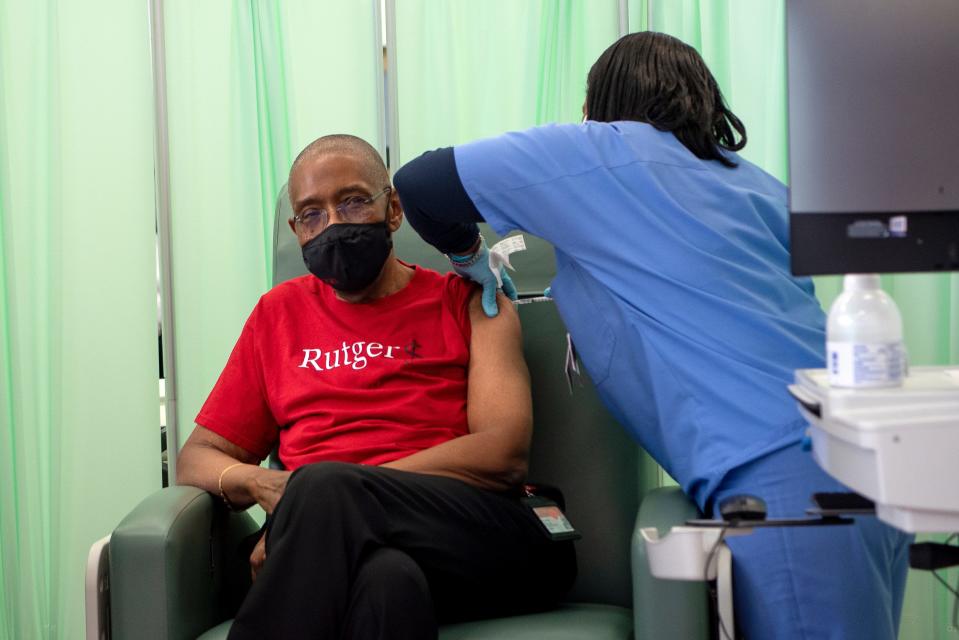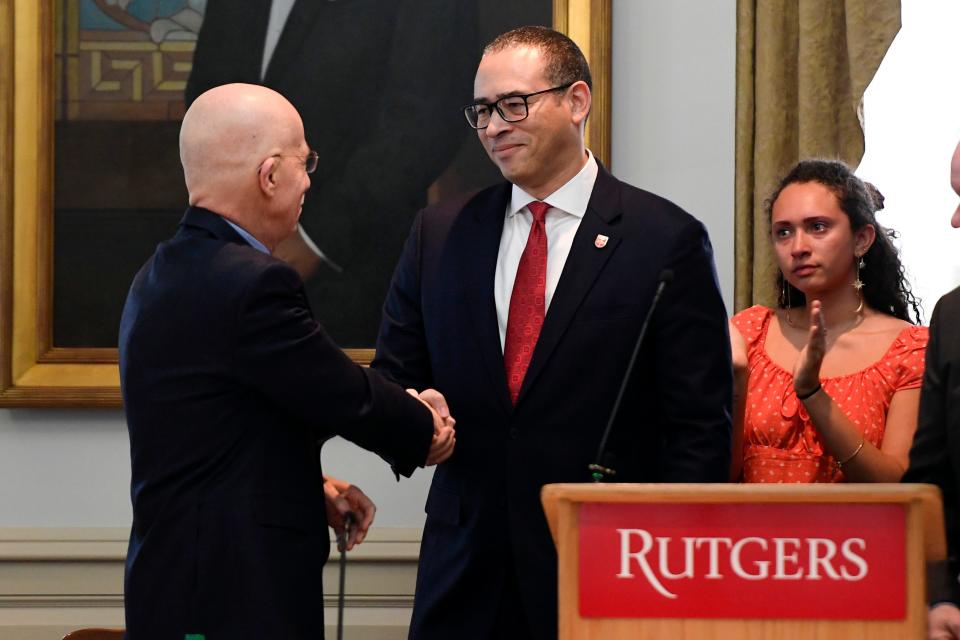Rutgers governors vote yes to merging two medical schools in controversial move
Rutgers University's Board of Governors, facing nearly unanimous resistance from faculty, students, Newark-based community organizations and some Newark politicians, voted to initiate the merger of two medical schools on two campuses, in a move some say could create the nation's largest medical campus.
Monday's vote authorizing the merger of two Rutgers entities, New Jersey Medical School (NJMS) in Newark and Robert Wood Johnson Medical School (RWJMS) in New Brunswick, into the newly named Rutgers School of Medicine could allow students to start enrolling in 2028 under a single accreditation system. The merger must be approved by an independent accreditation authority, the Liaison Committee on Medical Education.
The plan has been widely criticized as lacking transparency by not doing a good enough job of laying out the merger's fiscal and programming impact on students and faculty. Critics also say bringing the hospital and medical school in Newark under one banner with the New Brunswick medical school and its corporate affiliate, RWJBarnabas, could diminish their ability to serve Newark's vulnerable population.

The university has conducted public town halls and said it issued two explanatory reports to address concerns expressed by faculty and students ever since medical school Chancellor Brian Strom first floated the merger plan in January 2019. But criticism continued and was rekindled on June 30, when Strom informed the University Senate that a resolution to authorize the merger was on the agenda for the July 10 meeting of the Board of Governors.
The Board of Governors then went ahead and voted unanimously to approve the merger plan on Monday, ignoring a formal resolution from the University Senate requesting that it remove the vote from its agenda until the body endorsed the merger. University policy requires the Senate to endorse a multi-unit merger, but university and medical school spokespersons did not address a question about why the board decided to bypass the Senate's role.
Rutgers: Affirmative action ruling won't deter Rutgers, Princeton diversity pushes, officials say
The administration's approach showed that the spirit of shared governance at the university is dead, said Paul Boxer, a Senate member, responding to the vote. The vote, criticized by many faculty members, comes just months after a first-ever faculty strike shut down the Rutgers campuses for a week in April.
The Senate has also called out the Murphy administration and the university for considering a massive merger in the absence of state legislation, citing a practice in New Jersey of combining higher education entities by passing laws.
Key faculty bodies say the plan lacks transparency and honesty, and that combining the two schools could reduce the number of residency spots in the programs while ignoring more urgent needs, such as repairing and improving the deteriorating Medical Science Building in Newark.
Faculty members and doctors addressing the Board of Governors before the vote Monday expressed a lack of trust in assurances from Strom and Rutgers President Jonathan Holloway that Newark's University Hospital and medical school would benefit from the merger, saying an existing, yearslong relationship between Rutgers University and the Newark medical school has not delivered.

"I can speak to the severe and significant deterioration of clinical services and support since Rutgers came to University Hospital and New Jersey Medical School," said Dr. Catherine Mazzola, a neurosurgeon at University Hospital.
The Newark medical campus "hoped and expected an academic and a fiscal benefit through our association with Rutgers. We were willing partners in the association, but what has happened was a loss and misappropriation" of already limited resources, she said. Service lines, physicians and residents were reassigned to health systems at Cooperman, St. Barnabas and Robert Wood Johnson and taken out of Newark, she said.
Mazzola echoed fears expressed by a veteran nurse at University Hospital, Banita Herndon, that the struggling but localized services patients depend on would be further diluted. Voting no was required to remain on “the right side of history,” Herndon told the board.
The merger needed to stay true to the Newark Accords, drafted after the riots in 1967, which committed Rutgers and other state entities to promoting public health in the city, Mazzola told the board.
Rutgers: Here are the raises, new benefits included in Rutgers union contracts approved today
"The [medical] residents loved their experience in Newark. Many of the residents did not have a good experience in New Brunswick," she said, speaking about her concerns regarding the merger's impact on the academic program.
"We are not talking about merging anything back and forth, but merely talking about merging their accreditation," Strom, the medical school chancellor, said at the meeting. "The University Senate’s feedback and school town halls and a public webpage have been very useful to the administration and have been around for some years."
In an email sent to the university after the vote, Strom and Holloway wrote: "Although there are many details to be worked through with the university community, it is important to understand that NJMS will of course remain in Newark and maintain its ties with the Newark community." University Hospital Newark would continue as the principal teaching hospital of NJMS in Newark, and RWJMS would remain in Middlesex County and maintain its ties there, the email said.
The vote took place during a virtual meeting Monday morning that some said was held conveniently during summer break, when critics of the vote and the merger could not assemble to protest it.
Strom first proposed the merger in 2019, but he saw pushback from the University Senate, the faculty's governing body, the medical school's faculty unions, students at the Newark medical school, community groups in the city, Newark Mayor Ras Baraka and state lawmakers including Sen. Teresa Ruiz, D-Newark.
“The primary objective behind pursuing a single medical school accreditation is to create a stronger, more innovative institution that offers significantly enhanced educational opportunities, expanded research endeavors and improved patient care,” medical school Deans Robert L. Johnson and Amy Murtha wrote in an email Monday to faculty, students and staff, according to a statement released by the university.
“This integration will empower Rutgers to navigate the dynamic landscape of health care, meeting the ever-evolving and complex needs of the future while flourishing amidst a competitive market,” Strom said in the statement. “We will amplify Rutgers’ position as a trailblazer in 21st-century medical education and solidify our role as a leader in advancing the frontiers of health care."
Meanwhile, union leaders said they will fight the plan to merge, including possibly using legal challenges.
"It is a sad day that this is being pushed through despite unanimous opposition from faculty, students and the community. We will evaluate our options to keep fighting," said Diomedes Tsitouras, executive director of the AAUP-BHSNJ union, representing clinicians at Rutgers Biomedical and Health Sciences.
This article originally appeared on NorthJersey.com: Rutgers plans to merge medical schools after governors vote

